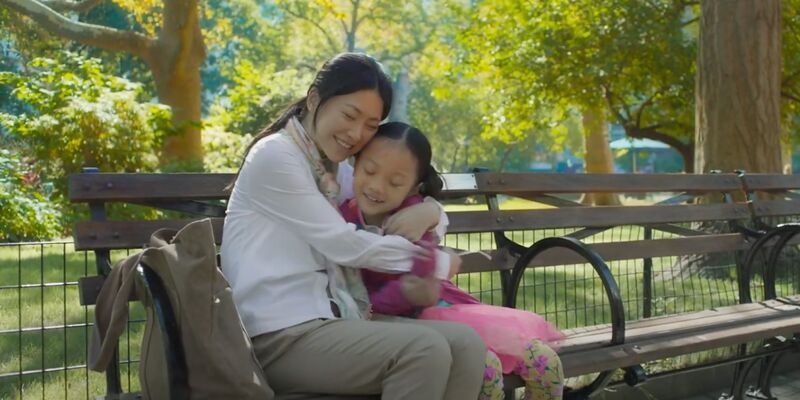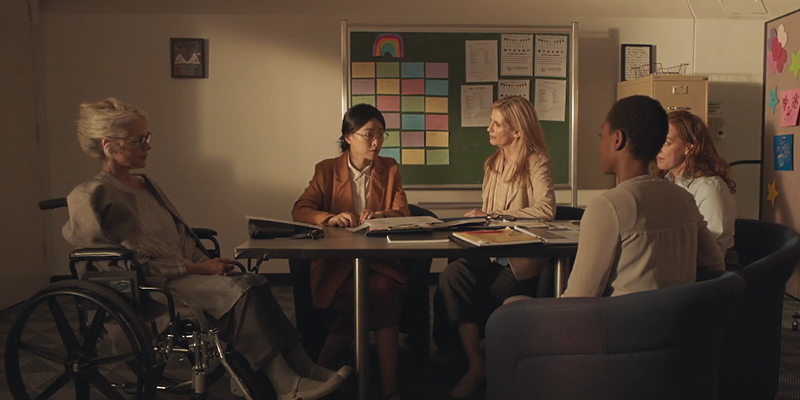
Review by Benjamin Poole
Directed by: Ann Hu
Starring: Zhu Zhu, Harmonie He, Amy Irving, Helen Slater

As an ominous title card informs us at the end of Confetti, writer/director Ann Hu’s dyslexia drama, there are "at least 1 in 10 people who are dyslexic... putting them at risk of life-long illiteracy and social exclusion." This missive is compounded by publicity which suggests the events of Confetti are based upon a "true story": Hu’s own experience with American and Chinese education systems.
Cherubic Meimei (Harmonie He) is struggling in the sort of regimented classroom which 'Hard Times' era Dickens would balk at for being a bit on the nose. Nonetheless, a laid back, long haired guitar playing TEFL with magical western insight tells mum Chen Lan (Zhu Zhu) that Meimei is "a smart kid," before suggesting that the girl would fare better in the American system. Harbouring a shameful secret regarding her own literacy, we follow Chen Lan as she promptly decides to pack up her daughter and turn up at the land of opportunity in search of a more prosperous pedagogical experience for Meimei.

Is there a profession represented more harmfully in cinema than teaching? Ask any teacher (half my family are at the chalkface, and quite a few friends, too. I love teachers, they’re always bright, kind and have the sort of warm confidence which enables them to stand in front of hundreds of different kids in a week - very attractive), and they will tell you in no uncertain terms how much they fucking despise films like Dangerous Minds, Coach Carter and, the most pernicious of all, the utterly despicable Dead Poet’s Society (where kids are not, in fact, actually taught poetry properly but instead parroted simple soundbites, prefiguring Facebook inspo-quotes. As if name dropping Tennyson is the same as appreciating and understanding his sustained melodious structures: disgrace)*. The issue with these films is that education, and methods of teaching and learning, are by their very nature a two-steps-forward-one-step-back process of dedicated progress. Not the type of incremental dynamic which lends itself to the easy, cathartic solutions of narrative cinema. The rousing speech from the coach which leads to hometown victory, the inspirational one-to-one between the maverick teacher and the mixed-up kid which sets the latter on the right road to acceptable SAT scores: all a con. And the problem is, people actually believe this sort of nonsense because it reassures them teaching is about climactic wins, the glib bromide offered at the opportune moment, and that teaching is breezy (the best part of lockdown was seeing hitherto smug parents having meltdown after tantrum on social media attempting to ‘home school’ their offspring: hahahahaha, turns out it isn’t so easy after all, you mugs).
Confetti exemplifies said issues, but, due to the tediously bureaucratic nature of Chen Lan’s quest, not even with an escapist punch-the-air glee. Hu’s direction is stately, and Confetti’s mise-en-scene is composed of a suitably sober matte, all to serve her script, which is more rhetoric than story. And a patchy one at that. Conflict first occurs when Chen Lan and Meimei turn up in the amazingly named Helen McClellan’s apartment (Amy Irving - let’s hope Meimei’s incipient educational encounters don’t involve a prom, etc). Helen is in a wheelchair and to illustrate this defining aspect of her character, Chen Lan and Meimei propitiously arrive as she falls out of said contraption. Helen has taken on the pair as a favour to Mr Bergstrom from earlier (deep cut Simpsons ref for the real fans of pedagogical representations). How is this ever going to work?! Helen is a cranky old writer, Chen Lan and Meimei are not American! They slurp their soup, and Meimei touches Helen’s computer. Such drama. Thankfully, they discover a common enemy: the American public school system. Those bastards.

Meimei’s encounters within the American public school system are positioned as wholly negative. It’s confusing. I’m not sure how things work in the American school system with new visitors to the country, but, in this film at least, Meimei is immediately enrolled within a school. Also, the Principal offers Chen Lan one to one face time. Furthermore, Meimei’s teacher seems overwhelmed by her everyday of tens of kids who need to be taught but does manage to make space for personal contact with this little kid who doesn’t have English as a first language. For Chen Lan though, her head full of dreams inspired by some guitar toting hippy, along with, it seems, the film, none of this is enough. The answer? A special institute where Meimei’s dyslexia will be magically cured/provided for. Problem is that parents who are applying for this private school need to shell out $5000 for a neuro-psych evaluation before they’ll even be considered for a place.
There’s always money to be made where education is concerned, always a racket. The stakes involved: children, the future; these are trigger aspects ripe for the unscrupulous to exploit, with most of this snake-oil coming from American educationalists/charlatans. This appalling principle is observed by Confetti but not challenged, with Meimei’s place at the institute positioned as aspirational, and a marked difference to the chaotic school where other, less exceptional, kids go to. The institute offers a type of gimmick teaching which suits the visual aspect of cinema; at one point, dyslexia is tackled by getting kids to read standing on their head. It’s absolute nonsense of course, with the film espousing the sort of VARK model of learning which was in vogue two decades ago and has since been rubbished by science. What is needed by Meimei is patience, enduring support and the resilience to cope with a prolonged trial and error approach to reading. But what is required by the film at this point is a pat narrative conclusion.

At the end of the film it turns out that Meimei is actually some sort of genius because she puts together a heart-warming animation about her mother on a computer. ‘Phew’, I suppose (sticking kids in front of an electronic device as if it’s the answer is the most destructive approach to education, ever). Yes, alright, it did make me cry - but only because I am susceptible to the sort of emotional manipulation Confetti trades in. Do we see Meimei overcome her dyslexia? No, of course not. The development of such strategies take the sort of time and repetitive process that Confetti’s plot can ill afford. Instead, the film and its ideas surrounding education are as insubstantial as the material it eponymizes.

*They do all, however, love the Nativity films.
Confetti is in UK cinemas from October 21st.

